Fleurs du Mal Magazine


Or see the index
Onder de titels Wilden en Nieuwe Wilden presenteren Museum de Fundatie en het Groninger Museum tot en met 18 september 2016 een dubbeltentoonstelling gewijd aan het 20ste-eeuwse expressionisme in Duitsland. In Museum de Fundatie staat het expressionisme uit het begin van de eeuw centraal, het Groninger Museum toont het neo-expressionisme uit de jaren ’80. Meer dan een halve eeuw scheidt de beide bewegingen, toch is er bij alle verschillen een duidelijke gemene deler: artistieke vrijheid zonder compromis.
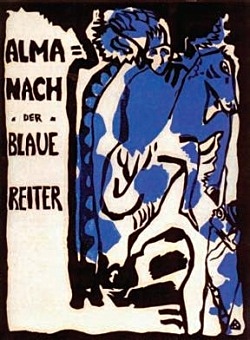 Artistieke conventies en academische regels werden ingeruild voor subjectieve ervaringen. In Duitsland manifesteerde het expressionisme zich aan het begin van de twintigste eeuw in het werk van leden van de kunstenaarsgroeperingen ‘Brücke’ en ‘Der Blaue Reiter’. Met hun compromisloze visie veranderden kunstenaars als Alexej von Jawlensky, Wassily Kandinsky, Emil Nolde, Ernst Ludwig Kirchner, August Macke, Franz Marc en Max Pechstein voorgoed het gezicht van de moderne kunst. De expositie WILDEN – Expressionisme van ‘Brücke’ & ‘Der Blaue Reiter’, toont met zo’n 100 werken het eerste grote museale overzicht in Nederland van Duitse expressionistische schilderkunst.
Artistieke conventies en academische regels werden ingeruild voor subjectieve ervaringen. In Duitsland manifesteerde het expressionisme zich aan het begin van de twintigste eeuw in het werk van leden van de kunstenaarsgroeperingen ‘Brücke’ en ‘Der Blaue Reiter’. Met hun compromisloze visie veranderden kunstenaars als Alexej von Jawlensky, Wassily Kandinsky, Emil Nolde, Ernst Ludwig Kirchner, August Macke, Franz Marc en Max Pechstein voorgoed het gezicht van de moderne kunst. De expositie WILDEN – Expressionisme van ‘Brücke’ & ‘Der Blaue Reiter’, toont met zo’n 100 werken het eerste grote museale overzicht in Nederland van Duitse expressionistische schilderkunst.
Niet de buitenwereld maar de binnenwereld, daar ging het de expressionisten om. Kunst als uitdrukking van emotie en innerlijke beleving.
De baanbrekende kunst van het expressionisme was de weerslag van sociale en wetenschappelijke veranderingen in de jaren vóór en vlak na de Eerste Wereldoorlog in Duitsland. De oprukkende industrialisering, de explosief groeiende steden, de ‘ontgoddelijking’ van de samenleving – “God is dood”, zei Nietzsche –, de ontdekking van het onderbewuste en de opkomst van de psychoanalyse, alsook de ontwikkeling van de kwantummechanica en relativiteitstheorie zetten het vertrouwde mens- en wereldbeeld op zijn kop. Oude zekerheden vielen weg en een nieuwe, grotendeels (nog) onbekende realiteit diende zich aan. De unieke positie van de mens in de schepping werd betwijfeld. De expressionistische kunstenaars keerden zich tegen het materialistische vooruitgangsdenken, dat vooral zakelijk en rationeel was. Zij richtten zich voortaan op de geestelijke wereld die achter de materie schuilging en wilden de band tussen mens en natuur herstellen.
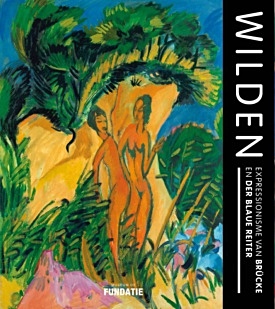 De expressionisten stonden kritisch tegenover het onpersoonlijke stadsleven en verheerlijkten de eenvoud van het platteland. Zogenaamd primitieve volkeren werden als de ware erfgenamen van het verloren paradijs tot voorbeeld genomen, zowel in leven als in kunst. Geen materialisme en burgerlijkheid, maar originaliteit en echt contact. In artistieke zin was het expressionisme een reactie op het inmiddels als gezapig betitelde impressionisme, dat – letterlijk – oppervlakkig werd bevonden door zijn focus op de buitenkant van de wereld. Kunstenaars van ‘Brücke’ en ‘Der Blaue Reiter’, opgericht in respectievelijk in 1905 in Dresden en in 1911 in München, hielden zich juist bezig met het innerlijk en met de oorspronkelijke, geestelijke eenheid van mensen, dieren en planten. Zij wilden niet de optische realiteit weergeven, maar de subjectieve ervaring van de mens in zijn natuurlijke omgeving. Bevrijd van de noodzaak zich te houden aan de werkelijkheid zochten de Duitse expressionisten naar alternatieve methoden om hun visie uit te dragen. Ongekend felle kleuren en krachtige vormen werden de dragers van ideeën en emoties. Nolde, Kirchner, Pechstein en andere leden van ‘Brücke’ bleven bij alle stilering vasthouden aan de herkenbaarheid van hun onderwerpen. Leden van ‘Der Blaue Reiter’, met name Jawlensky en Kandinsky, voerden hun streven naar vergeestelijking daarentegen zo hoog op dat zij de materiële wereld oplosten in een volledig voorstellingsloos beeld. Zodoende stonden zij mede aan de basis van de abstracte kunst.
De expressionisten stonden kritisch tegenover het onpersoonlijke stadsleven en verheerlijkten de eenvoud van het platteland. Zogenaamd primitieve volkeren werden als de ware erfgenamen van het verloren paradijs tot voorbeeld genomen, zowel in leven als in kunst. Geen materialisme en burgerlijkheid, maar originaliteit en echt contact. In artistieke zin was het expressionisme een reactie op het inmiddels als gezapig betitelde impressionisme, dat – letterlijk – oppervlakkig werd bevonden door zijn focus op de buitenkant van de wereld. Kunstenaars van ‘Brücke’ en ‘Der Blaue Reiter’, opgericht in respectievelijk in 1905 in Dresden en in 1911 in München, hielden zich juist bezig met het innerlijk en met de oorspronkelijke, geestelijke eenheid van mensen, dieren en planten. Zij wilden niet de optische realiteit weergeven, maar de subjectieve ervaring van de mens in zijn natuurlijke omgeving. Bevrijd van de noodzaak zich te houden aan de werkelijkheid zochten de Duitse expressionisten naar alternatieve methoden om hun visie uit te dragen. Ongekend felle kleuren en krachtige vormen werden de dragers van ideeën en emoties. Nolde, Kirchner, Pechstein en andere leden van ‘Brücke’ bleven bij alle stilering vasthouden aan de herkenbaarheid van hun onderwerpen. Leden van ‘Der Blaue Reiter’, met name Jawlensky en Kandinsky, voerden hun streven naar vergeestelijking daarentegen zo hoog op dat zij de materiële wereld oplosten in een volledig voorstellingsloos beeld. Zodoende stonden zij mede aan de basis van de abstracte kunst.
Wilden – Expressionisme
van ‘Brücke’ en ‘Der Blaue Reiter’
t/m 18 september 2016
Museum de Fundatie
Blijmarkt 20
8011 NE Zwolle
Telefoon: 0572 388188
info@museumdefundatie.nl
# meer info website museum de fundatie
fleursdumal.nl magazine
More in: *War Poetry Archive, Art & Literature News, Exhibition Archive, EXPERIMENTAL POETRY, Expressionism, Expressionisme, Galerie Deutschland, PRESS & PUBLISHING
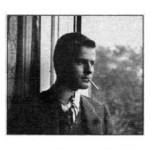
Hans Leybold
(1892-1914)
Ende
Die Wellen meiner bunten Räusche sind verdampft.
Breit schlagen, schwer und müd
die Ströme meines Lebens über Bänke
von Sand.
Mir schmerzen die Gelenke.
In mein Gehirn
hat eine maßlos große Faust sich eingekrampft.
Hans Leybold poetry
fleursdumal.nl magazine
More in: *War Poetry Archive, Archive K-L, Leybold, Hans
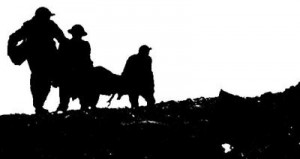
Wilfred Owen
(1893-1918)
Anthem for Doomed Youth
What passing bells for these who die as cattle?
– Only the monstrous anger of the guns.
Only the stuttering rifles’ rapid rattle
Can patter out their hasty orisons.
No mockeries now for them; no prayers nor bells;
Nor any voice of mourning save the choirs, –
The shrill demented choirs of wailing shells;
And bugles calling for them from sad shires.
What candles may be held to speed them all?
Not in the hands of boys, but in their eyes
Shall shine the holy glimmers of goodbyes.
The pallor of girls’ brows shall be their pall;
Their flowers the tenderness of patient minds,
And each slow dusk a drawing-down of blinds.
Wilfred Owen poetry
fleursdumal.nl magazine
More in: Archive O-P, Owen, Wilfred
Bert
BEVERS
Sedan, april 1940
Aan een grens een stadje dat
sluimert tegen verre heuvels.
Geen vijand valt er te bekennen.
Een officier te paard trekt
ter inspectie langs de wegen,
in handen los de teugels.
Onaangekondigd meldt de tijd
zich aan de poorten die
in rust gedompeld zijn.
Wat valt er hier dan meer te doen
dan in alledaagse sleur
te worden overrompeld?
Bert Bevers
(Verschenen in De Tweede Ronde, Amsterdam, 8ste jaargang, nummer 4)
fleursdumal.nl magazine
More in: *War Poetry Archive, Archive A-B, Bevers, Bert
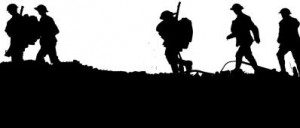
Wilfred Owen
(1893 – 1918)
A Terre
(being the philosophy of many soldiers)
Sit on the bed. I’m blind, and three parts shell.
Be careful; can’t shake hands now; never shall.
Both arms have mutinied against me,-brutes.
My fingers fidget like ten idle brats.
I tried to peg out soldierly,-no use!
One dies of war like any old disease.
This bandage feels like pennies on my eyes.
I have my medals?-Discs to make eyes close.
My glorious ribbons?-Ripped from my own back
In scarlet shreds. (That’s for your poetry book.)
A short life and a merry one, my buck!
We used to say we’d hate to live dead-old,-
Yet now…I’d willingly be puffy, bald,
And patriotic. Buffers catch from boys
At least the jokes hurled at them. I suppose
Little I’d ever teach a son, but hitting,
Shooting, war, hunting, all the arts of hurting.
Well, that’s what I learnt,-that, and making money.
Your fifty years ahead seem none too many?
Tell me how long I’ve got? God! For one year
To help myself to nothing more than air!
One Spring! Is one too good to spare, too long?
Spring wind would work its own way to my lung,
And grow me legs as quick as lilac-shoots.
My servant’s lamed, but listen how he shouts!
When I’m lugged out, he’ll still be good for that.
Here in this mummy-case, you know, I’ve thought
How well I might have swept his floors for ever.
I’d ask no nights off when the bustle’s over,
Enjoying so the dirt. Who’s prejudiced
Against a grimed hand when his own’s quite dust,
Less live than specks that in the sun-shafts turn,
Less warm than dust that mixes with arms’ tan?
I’d love to be a sweep, now, black as Town,
Yes, or a muckman. Must I be his load?
O Life, Life, let me breathe,-a dug-out rat!
Not worse than ours the lives rats lead-
Nosing along at night down some safe rut,
They find a shell-proof home before they rot.
Dead men may envy living mites in cheese,
Or good germs even. Microbes have their joys,
And subdivide, and never come to death.
Certainly flowers have the easiest time on earth.
‘I shall be one with nature, herb, and stone’
Shelley would tell me. Shelley would be stunned:
The dullest Tommy hugs that fancy now.
‘Pushing up daisies’ is their creed, you know.
To grain, then, go my fat, to buds my sap,
For all the usefulness there is in soap.
D’you think the Boche will ever stew man-soup?
Some day, no doubt, if…Friend, be very sure
I shall be better off with plants that share
More peaceably the meadow and the shower.
Soft rains will touch me,-as they could touch once,
And nothing but the sun shall make me ware.
Your guns may crash around me. I’ll not hear;
Or, if I wince, I shall not know I wince.
Don’t take my soul’s poor comfort for your jest.
Soldiers may grow a soul when turned to fronds,
But here’s the thing’s best left at home with friends.
My soul’s a little grief, grappling your chest,
To climb your throat on sobs; easily chased
On other sighs and wiped by fresher winds.
Carry my crying spirit till it’s weaned
To do without what blood remained these wounds.
Wilfred Owen poetry
fleursdumal.nl magazine
More in: *War Poetry Archive, Archive O-P, Owen, Wilfred
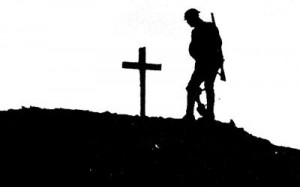
Wilfred Owen
(1893 – 1918)
Arms and the Boy
Let the boy try along this bayonet-blade
2How cold steel is, and keen with hunger of blood;
Blue with all malice, like a madman’s flash;
And thinly drawn with famishing for flesh.
Lend him to stroke these blind, blunt bullet-heads
Which long to muzzle in the hearts of lads.
Or give him cartridges of fine zinc teeth,
Sharp with the sharpness of grief and death.
For his teeth seem for laughing round an apple.
There lurk no claws behind his fingers supple;
And God will grow no talons at his heels,
Nor antlers through the thickness of his curls.
Wilfred Owen poetry
fleursdumal.nl magazine
More in: Archive O-P, Owen, Wilfred

Alun Lewis
(1915 – 1944)
Postscript: For Gweno
If I should go away,
Beloved, do not say
‘He has forgotten me’.
For you abide,
A singing rib within my dreaming side;
You always stay.
And in the mad tormented valley
Where blood and hunger rally
And Death the wild beast is uncaught, untamed,
Our soul withstands the terror
And has its quiet honour
Among the glittering stars your voices named.
Alun Lewis poetry
fleursdumal.nl magazine
More in: Lewis, Alun, WAR & PEACE

T.E. Hulme
(1883 – 1917)
Trenches: St Eloi
Over the flat slopes of St Eloi
A wide wall of sand bags.
Night,
In the silence desultory men
Pottering over small fires, cleaning their mess- tins:
To and fro, from the lines,
Men walk as on Piccadilly,
Making paths in the dark,
Through scattered dead horses,
Over a dead Belgian’s belly.
The Germans have rockets. The English have no rockets.
Behind the line, cannon, hidden, lying back miles.
Behind the line, chaos:
My mind is a corridor. The minds about me are corridors.
Nothing suggests itself. There is nothing to do but keep on.
T.E. Hulme poetry
fleursdumal.nl magazine
More in: Archive G-H, Hulme, T.E., WAR & PEACE

Alun Lewis
(1915 – 1944)
Goodbye
So we must say Goodbye, my darling,
And go, as lovers go, for ever;
Tonight remains, to pack and fix on labels
And make an end of lying down together.
I put a final shilling in the gas,
And watch you slip your dress below your knees
And lie so still I hear your rustling comb
Modulate the autumn in the trees.
And all the countless things I shall remember
Lay mummy-cloths of silence round my head;
I fill the carafe with a drink of water;
You say ‘We paid a guinea for this bed,’
And then, ‘We’ll leave some gas, a little warmth
For the next resident, and these dry flowers,’
And turn your face away, afraid to speak
The big word, that Eternity is ours.
Your kisses close my eyes and yet you stare
As though god struck a child with nameless fears;
Perhaps the water glitters and discloses
Time’s chalice and its limpid useless tears.
Everything we renounce except our selves;
Selfishness is the last of all to go;
Our sighs are exhalations of the earth,
Our footprints leave a track across the snow.
We made the universe to be our home,
Our nostrils took the wind to be our breath,
Our hearts are massive towers of delight,
We stride across the seven seas of death.
Yet when all’s done you’ll keep the emerald
I placed upon your finger in the street;
And I will keep the patches that you sewed
On my old battledress tonight, my sweet.
(1942)
War + Poetry: Alun Lewis
fleursdumal.nl magazine
More in: Archive K-L, Lewis, Alun

Edward Thomas
(1878 – 1917)
As the team’s head brass
As the team’s head brass flashed out on the turn
The lovers disappeared into the wood.
I sat among the boughs of the fallen elm
That strewed an angle of the fallow, and
Watched the plough narrowing a yellow square
Of charlock. Every time the horses turned
Instead of treading me down, the ploughman leaned
Upon the handles to say or ask a word,
About the weather, next about the war.
Scraping the share he faced towards the wood,
And screwed along the furrow till the brass flashed
Once more.
The blizzard felled the elm whose crest
I sat in, by a woodpecker’s round hole,
The ploughman said. ‘When will they take it away?’
‘When the war’s over.’ So the talk began –
One minute and an interval of ten,
A minute more and the same interval.
‘Have you been out?’ ‘No.’ ‘And don’t want to, perhaps?’
‘If I could only come back again, I should.
I could spare an arm. I shouldn’t want to lose
A leg. If I should lose my head, why, so,
I should want nothing more….Have many gone
From here?’ ‘Yes.’ ‘Many lost?’ ‘Yes, a good few.
Only two teams work on the farm this year.
One of my mates is dead. The second day
In France they killed him. It was back in March,
The very night of the blizzard, too. Now if
He had stayed here we should have moved the tree.’
‘And I should not have sat here. Everything
Would have been different. For it would have been
Another world.’ ‘Ay, and a better, though
If we could see all all might seem good.’ Then
The lovers came out of the wood again:
The horses started and for the last time
I watched the clods crumble and topple over
After the ploughshare and the stumbling team.
Edward Thomas poetry
fleursdumal.nl magazine
More in: Archive S-T, Thomas, Edward
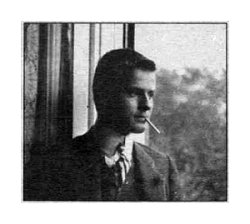
Hans Leybold
(1892-1914)
Der Tod des Menschen
Er hatte auf einmal kein Gesicht mehr.
Wo das sonst war, war nun eine weiße Fläche.
Seine Augen waren hinter die Schädelwand gerutscht.
Die Hände lagen unter seinen Füßen: man wusste
nicht, wie sie dorthin gekommen waren.
Seine Stimme war unter den Tisch gefallen; hatte
dort gescheppert, wie ein Tonteller; und war
dann plötzlich zerbrochen, mit einem letzten Klang.
Eine unvermutete Zigarre rauchte sich selbst auf.
Blies blaue Dünste.
Die krochen schweigsam in die getilgten Nasenlöcher des Menschen.
Da bissen sie sich fest; kratzten unnervige Wände. – –
Des Menschen Seele aber stolperte schon in paradiesischen Feldern.
Keine Windmühle störte seine nichterhoffte Aussicht.
Der Blick war weit und groß und grün.
Insekten tanzten golden.
Äcker brannten.
Hans Leybold poetry
fleursdumal.nl magazine
More in: *War Poetry Archive, Archive K-L, Expressionism, Hans Leybold, Leybold, Hans
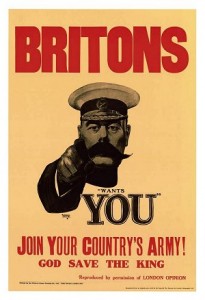
John Jarmain
(1911 – 1944)
El Alamein
There are flowers now, they say, at Alamein;
Yes, flowers in the minefields now.
So those that come to view that vacant scene,
Where death remains and agony has been
Will find the lilies grow –
Flowers, and nothing that we know.
So they rang the bells for us and Alamein,
Bells which we could not hear:
And to those that heard the bells what could it mean,
That name of loss and pride, El Alamein?
– Not the murk and harm of war,
But their hope, their own warm prayer.
It will become a staid historic name,
That crazy sea of sand!
Like Troy or Agincourt its single fame
Will be the garland for our brow, our claim,
On us a fleck of glory to the end:
And there our dead will keep their holy ground.
But this is not the place that we recall,
The crowded desert crossed with foaming tracks,
The one blotched building, lacking half a wall,
The grey-faced men, sand powdered over all;
The tanks, the guns, the trucks,
The black, dark-smoking wrecks.
So be it: none but us has known that land:
El Alamein will still be only ours
And those ten days of chaos in the sand.
Others will come who cannot understand,
Will halt beside the rusty minefield wires
And find there – flowers.
Mareth, Tunisia. March, 1943
John Jarmain poetry
fleursdumal.nl magazine
More in: Archive I-J, Jarmain, John
Thank you for reading Fleurs du Mal - magazine for art & literature